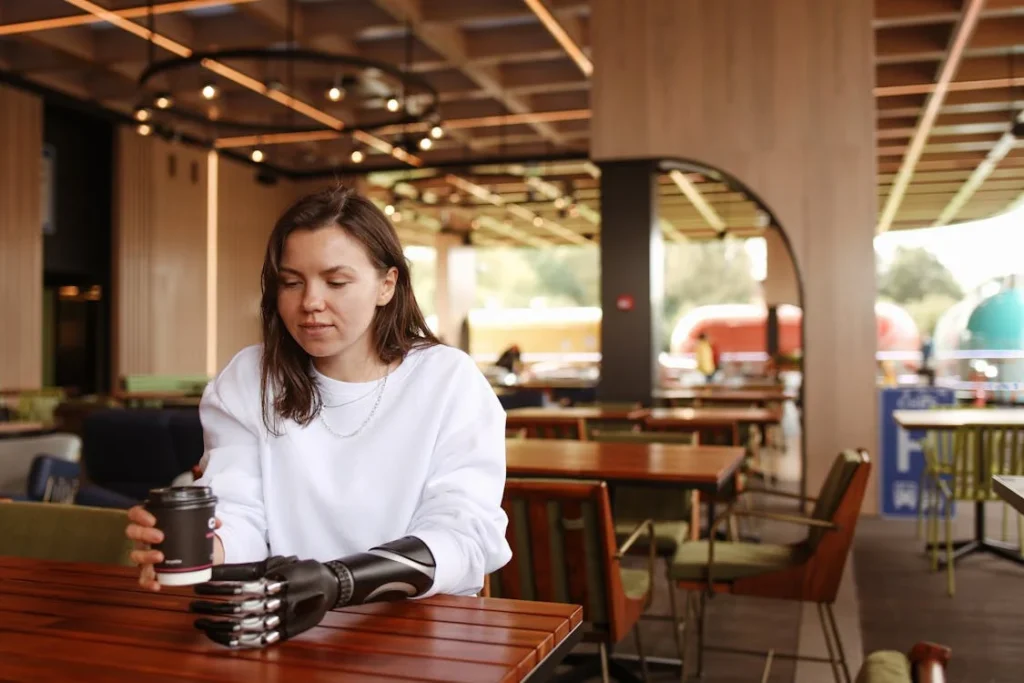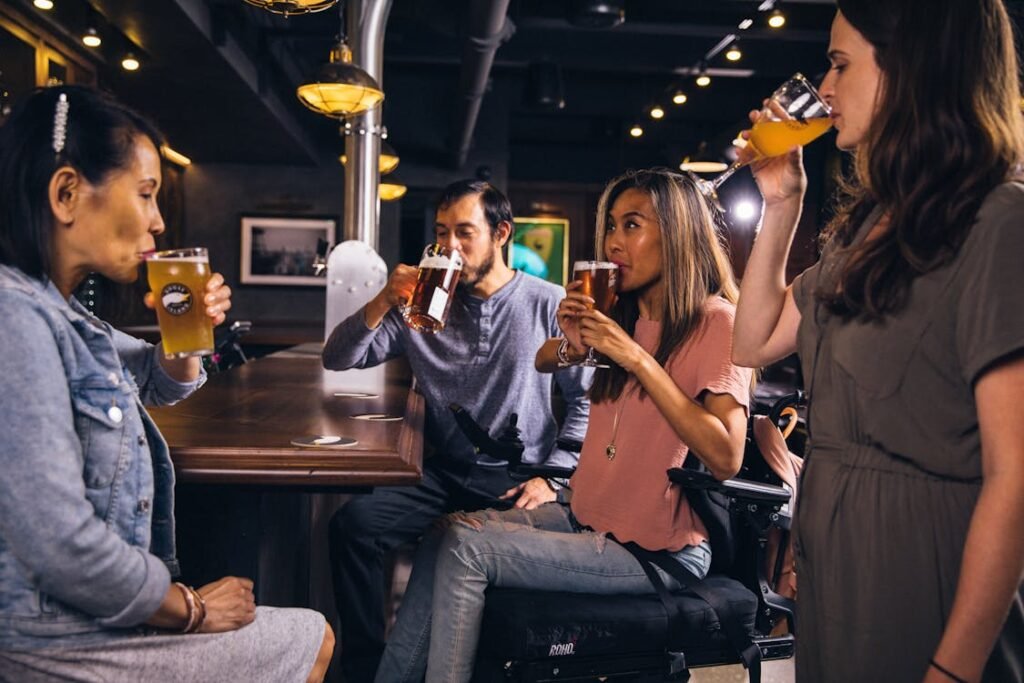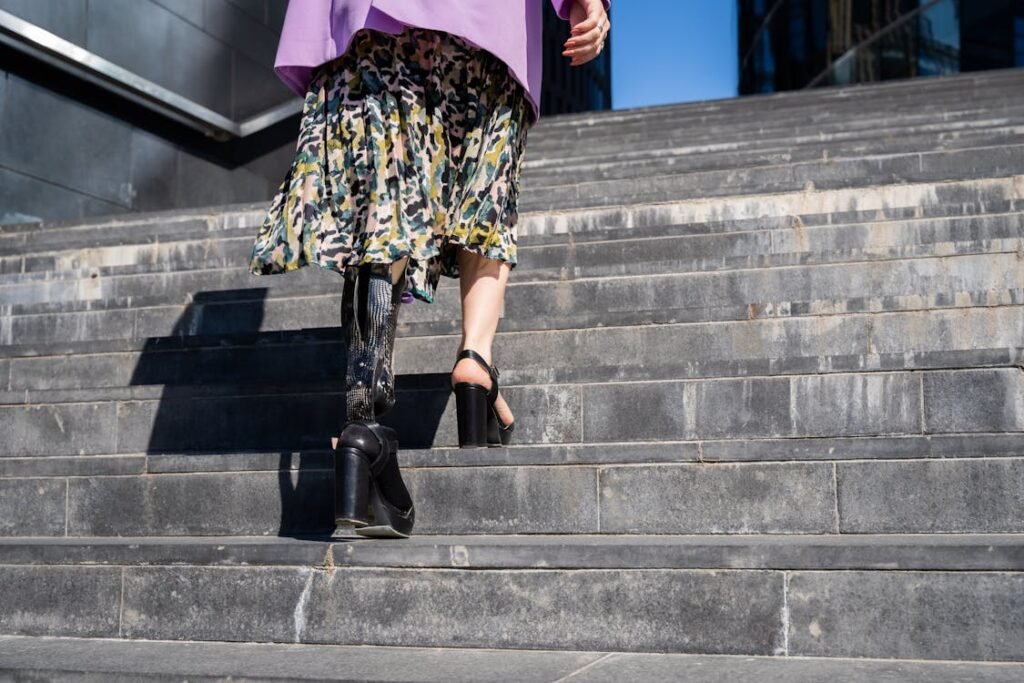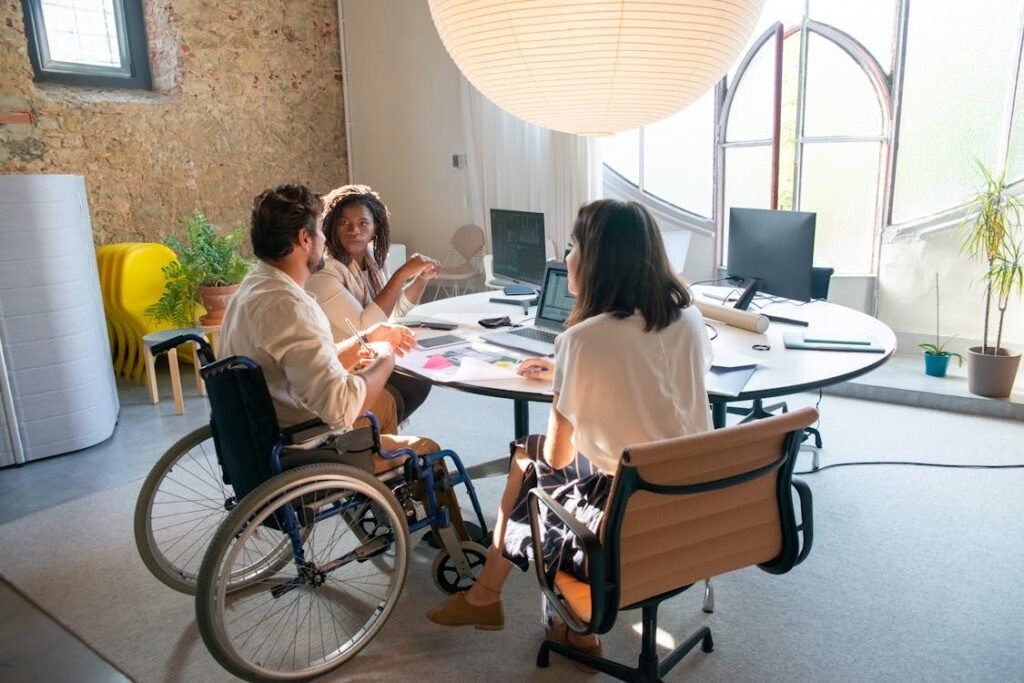Stepping into social situations as an amputee can feel overwhelming. You might worry about how people will react, whether they’ll stare, ask questions, or treat you differently. These concerns are completely normal. Social anxiety can make even simple interactions feel exhausting, leaving you unsure of how to handle conversations, public spaces, or even reconnecting with friends.
But life doesn’t have to feel this way. While social anxiety doesn’t disappear overnight, there are ways to manage it, regain confidence, and feel comfortable in your own skin again. The goal isn’t just to exist in social spaces but to thrive in them.

Understanding Social Anxiety as an Amputee
Social anxiety is more than just feeling shy or nervous in public. It’s the overwhelming fear of being judged, misunderstood, or seen differently.
As an amputee, this anxiety can become stronger because you may feel that your appearance attracts unwanted attention. You might avoid social situations, hesitate to meet new people, or feel self-conscious in crowds.
Why Social Anxiety Feels Stronger After Amputation
An amputation is a life-changing event. Beyond the physical adjustments, it can bring emotional and psychological challenges. You may feel like people see your limb difference before they see you.
You might wonder if old friends will treat you the same way or if strangers will pity you. This shift in perception can make social anxiety more intense.
Your mind may play out worst-case scenarios. “What if someone asks me what happened, and I don’t know how to respond?” “What if I trip while using my prosthetic and people stare?” “What if someone makes an insensitive comment?”
These thoughts can create a cycle of avoidance, where the fear of discomfort keeps you from engaging with the world.
The Impact of Avoidance
Avoiding social situations might feel like a way to protect yourself, but over time, it can make things harder. The more you withdraw, the more anxious you may feel when you do step out. Isolation can lead to loneliness, low self-esteem, and even depression.
Breaking this cycle starts with small steps—gradually reintroducing yourself to social settings while managing the anxiety that comes with them.
Overcoming social anxiety doesn’t mean forcing yourself into overwhelming situations. It means developing strategies to feel comfortable and in control. In the next section, we’ll explore how to rebuild confidence and handle social interactions in a way that feels natural.

Rebuilding Confidence in Social Situations
Overcoming social anxiety as an amputee begins with rebuilding confidence in yourself. Confidence isn’t about ignoring your fears—it’s about learning how to manage them while reminding yourself that you are more than your amputation.
The way you see yourself shapes how others see you. When you carry yourself with assurance, people will follow your lead.
Changing the Way You See Yourself
Your self-perception influences every social interaction. If you feel like your amputation makes you different in a negative way, you may assume that others see you the same way.
The truth is, most people don’t view limb loss as negatively as you might think. Many are simply curious or don’t know how to react.
Instead of focusing on what you’ve lost, focus on what you bring to the conversation. Your sense of humor, kindness, intelligence, and experiences are what define you—not your amputation.
Reframing your thoughts can help shift your mindset. Instead of thinking, They’re going to stare at my prosthetic, remind yourself, They might notice it, but that doesn’t change who I am.
Practicing Social Interactions
Confidence comes with practice. If you’ve been avoiding social situations, start small. Visit a familiar café, engage in a short conversation with a store clerk, or spend time with a trusted friend in a public place. These small steps help rebuild your comfort in being around people.
Practicing responses to common questions can also help reduce anxiety. If someone asks about your amputation, you can have a simple response ready, such as, “I lost my limb due to a medical condition, but I’m doing great now.”
Having a prepared answer allows you to stay in control of the conversation without feeling caught off guard.
Body Language and Social Presence
Your body language communicates confidence more than words do. Standing tall, maintaining eye contact, and smiling can make a big difference in how people respond to you. If you appear comfortable, others will feel at ease as well.
When you enter a room, resist the urge to shrink yourself. You belong in every space just as much as anyone else. Even if you don’t feel confident at first, acting as if you do can gradually shift your mindset.
Using Your Prosthetic as a Source of Strength
If you use a prosthetic limb, embracing it can help change the way you feel about social interactions. Instead of seeing it as something that makes you different, view it as a symbol of resilience.
People may be curious about it, and that’s okay. You have the power to decide how to engage with their curiosity.

Navigating Social Interactions with Ease
Once you start rebuilding confidence, the next step is handling social interactions in a way that feels natural and comfortable. Conversations, public outings, and meeting new people can feel intimidating at first, but with the right approach, they can become easier over time.
Handling Stares and Questions
One of the biggest sources of social anxiety as an amputee is the feeling of being watched. Whether you use a prosthetic or not, people may glance at your limb difference, sometimes out of curiosity rather than judgment.
While this attention can feel uncomfortable, it’s important to remember that a look does not define you.
If you catch someone staring, you have a few options. You can ignore it and continue with your day, which is often the easiest route. If you feel confident, a simple smile or nod can break the tension and show that you’re comfortable.
For those who are openly curious, you might choose to acknowledge them by saying something lighthearted like, “It’s a prosthetic—pretty cool, right?” This often shifts their curiosity into admiration.
When it comes to questions, people may ask out of genuine interest, but sometimes their wording may be awkward or even rude. Instead of feeling pressured to explain, remind yourself that you are in control of the conversation.
If you want to answer, keep it simple: “I lost my limb due to a medical issue, but I’m doing great now.” If you prefer not to discuss it, a polite but firm response like, “I’d rather not talk about that” is completely acceptable.
Engaging in Social Activities Again
If you’ve been avoiding social events because of anxiety, it may be time to ease back in. Start with smaller gatherings where you feel safe and supported. Being around close friends or family in a familiar setting can help you regain comfort before stepping into larger social spaces.
When you do attend public events, focusing on activities rather than social pressure can be helpful.
Engaging in something you enjoy—whether it’s a game, a shared hobby, or simply good conversation—takes the focus away from your amputation and places it on who you are as a person.
It’s also important to remind yourself that most people are more focused on themselves than on you.
Social anxiety often makes us believe that everyone is watching and judging, when in reality, people are usually too caught up in their own thoughts to notice every detail about someone else.
Meeting New People with Confidence
Introducing yourself to new people after an amputation can feel daunting. You might wonder how much to share or if they will treat you differently. The key is to lead the interaction with confidence.
If someone notices your prosthetic or limb difference and asks about it right away, you can choose to address it briefly and shift the conversation: “Yeah, I use a prosthetic. Anyway, how do you know [mutual friend]?”
This signals that while you’re open to talking about it, your amputation isn’t the most important thing about you.
Over time, you’ll notice that most people take their cues from you. If you act as though your amputation is just a part of your life—not something that defines you—others will follow suit.
At Robobionics, we know that confidence comes from feeling empowered. That’s why we create prosthetics like Grippy™, designed to help you move through life comfortably and naturally.
Whether you want a prosthetic that blends in or one that stands out, we support your journey toward self-assurance.

Coping with Social Anxiety in Everyday Situations
Overcoming social anxiety as an amputee isn’t just about big moments like attending events or meeting new people.
It’s also about feeling comfortable in everyday life—going to the grocery store, using public transportation, or simply walking down the street without feeling self-conscious. Small victories in these situations can add up, helping you regain control and confidence.
Stepping Out in Public Without Fear
The first few times you go out in public after your amputation can feel overwhelming. You might worry about people staring, making comments, or treating you differently. But the more you expose yourself to everyday situations, the more normal they will feel.
Start with short outings to familiar places. A quick trip to a local store, a walk in your neighborhood, or a coffee run can help ease you back into public spaces.
If you feel anxious, grounding techniques—like focusing on your breathing or repeating a calming phrase—can help bring your attention back to the present moment.
Wearing comfortable clothing and using a prosthetic that makes you feel secure can also boost your confidence. If you use a device like Grippy™, knowing that it functions well and fits properly can make you feel more at ease in public spaces.
Using Public Transportation with Confidence
If you rely on public transportation, you may worry about how others will react or whether you’ll need assistance. The key is to approach these situations with preparation and self-assurance.
If you need extra time to board a bus or train, remind yourself that it’s okay to move at your own pace.
If someone offers assistance, you can choose to accept or politely decline. There’s no shame in needing help, but you are also not obligated to accept it if you don’t want to. A simple response like, “I’ve got it, but thanks for offering” can help you stay in control of the interaction.
Many cities offer accessibility options, so familiarizing yourself with ramps, priority seating, or other accommodations can make travel easier. If you’re unsure, calling ahead or checking online for accessibility information can help reduce anxiety before your trip.
Navigating Work and Professional Spaces
Returning to work or starting a new job as an amputee can bring up concerns about how colleagues or clients will react. You might worry that people will see you differently or that you’ll have to constantly explain yourself.
The good news is that once the initial curiosity fades, most people will focus on your skills and personality rather than your amputation.
If you’re comfortable, setting the tone early can help. A simple introduction like, “I use a prosthetic to assist with daily tasks, but it doesn’t affect my work” can address curiosity upfront.
If someone asks intrusive questions, responding with, “I prefer to keep the focus on my work, but thanks for asking” can help set boundaries.
In professional spaces, confidence in your abilities is what truly matters. If you approach your job with the same professionalism and competence as before, others will do the same.
At Robobionics, we understand that adapting to life after an amputation is about more than just mobility—it’s about feeling comfortable in every environment.
Our prosthetics are designed to be lightweight and natural-feeling, so you can focus on your day without worrying about discomfort or limitations.

Building a Strong Support System
Overcoming social anxiety as an amputee is much easier when you have the right people around you. A strong support system can help you feel understood, accepted, and encouraged, especially when you’re facing moments of doubt or discomfort.
Having people who uplift you can make all the difference in how you approach social interactions.
Surrounding Yourself with Positive People
Not everyone will understand what you’re going through, and that’s okay. What matters most is having people in your life who respect and support you.
Spend time with those who see you for who you are, not just your amputation. These can be close friends, family members, coworkers, or even new acquaintances who bring positivity into your life.
If you have friends or family who unintentionally make you feel uncomfortable—whether by being overly sympathetic or treating you differently—you can gently guide them on how to interact with you.
Saying something like, “I appreciate your concern, but I’d rather focus on what I can do rather than what I’ve lost” can help shift the conversation toward empowerment.
Finding Community in Shared Experiences
One of the best ways to reduce social anxiety is to connect with others who have been through similar experiences. Finding a support group for amputees—whether in person or online—can remind you that you’re not alone.
These communities offer encouragement, advice, and a safe space to share your feelings without judgment.
If you’re looking for an in-person group, check with local rehabilitation centers, hospitals, or prosthetics providers. Online communities, social media groups, and forums can also be great places to connect.
Sometimes, just hearing someone say, “I know how you feel, and it gets easier” can make a huge difference in your confidence.
Talking to a Professional for Guidance
If social anxiety is deeply affecting your daily life, speaking with a therapist or counselor can provide valuable tools for managing it. Therapy can help you identify the thoughts and fears that hold you back and replace them with healthier, more constructive beliefs.
Cognitive Behavioral Therapy (CBT) is particularly effective for social anxiety. It helps you recognize negative thinking patterns and develop strategies to face social situations with greater ease.
Many therapists now offer virtual sessions, making it easier to find support from the comfort of your home.
Seeking help isn’t a sign of weakness—it’s a sign of strength. Taking control of your mental well-being is just as important as taking care of your physical health.
Strengthening Your Inner Resilience
While having supportive people around you is important, your biggest source of strength comes from within. Building self-acceptance takes time, but every step you take—whether it’s facing a fear, setting a boundary, or simply stepping outside with confidence—makes you stronger.
Social anxiety doesn’t have to control your life. By surrounding yourself with the right people, seeking guidance when needed, and believing in your own resilience, you can navigate social situations with greater confidence and ease.

Turning Social Anxiety into Social Confidence
Social anxiety may feel like an obstacle, but with time and effort, it can be transformed into social confidence. Confidence doesn’t mean being fearless—it means moving forward despite fear.
As an amputee, you have already overcome incredible challenges. Social interactions are just another hurdle you can learn to manage with the right mindset and approach.
Embracing Your Unique Story
One of the most powerful ways to overcome social anxiety is to embrace your story. Your amputation is a part of you, but it doesn’t define you. Instead of seeing it as something to hide or be ashamed of, you can view it as a mark of strength.
When you shift your perspective, the way others see you will shift too. People admire resilience. If you talk about your amputation with confidence and ease, they will take your lead and treat it as just another part of who you are.
You don’t have to share your story with everyone, but when you do, you can choose how to tell it. You can keep it brief, use humor, or focus on the positive aspects of your recovery. The way you frame your experience can turn social anxiety into empowerment.
Setting Small, Achievable Goals
If social situations feel overwhelming, break them down into smaller, manageable steps. Instead of pushing yourself into large gatherings right away, start with small goals that help you build confidence.
For example, if you feel anxious about eating in a restaurant, try going at a quieter time with a trusted friend.
If you worry about using public transportation, take a short ride to a familiar place before attempting longer journeys. The more you expose yourself to these situations, the easier they become.
Each time you accomplish a small goal, acknowledge it. Recognizing your progress, no matter how small, builds self-confidence over time.
Focusing on the Present Moment
Anxiety often comes from overthinking—imagining worst-case scenarios, worrying about how others perceive you, or anticipating awkward interactions. Instead of letting your mind spiral into what could go wrong, practice staying in the present moment.
Simple mindfulness techniques, like focusing on your breathing or engaging fully in the conversation at hand, can help you stay grounded. If you catch yourself overthinking, remind yourself: I am here, I am safe, and I can handle this.
Owning Your Space
You have just as much right to be in any social setting as anyone else. Whether you are at a party, in a workplace, or simply walking down the street, remind yourself that you belong.
Social confidence comes from owning your space—standing tall, making eye contact, and engaging with others without hesitation.
If someone treats you differently because of your amputation, that is a reflection of their mindset, not your worth. You don’t have to prove yourself to anyone. Simply being yourself is enough.
At Robobionics, we believe that confidence comes from feeling comfortable in your own body. That’s why our prosthetics, like Grippy™, are designed to be as natural and functional as possible, allowing you to move through life with ease and assurance.
Conclusion
Overcoming social anxiety as an amputee is a journey, not an overnight change. It takes time, patience, and practice. The more you step into social situations, the more comfortable and confident you will become. You don’t have to force yourself into overwhelming interactions—small steps, like visiting familiar places or engaging in brief conversations, can build your confidence over time.
Remember that your amputation does not define you. You are more than your physical appearance, and the people who truly matter will see you for who you are. Social anxiety thrives on fear and avoidance, but every time you challenge it, you take back control.
At Robobionics, we are here to support you in every way, from advanced prosthetics like Grippy™ to guidance on adjusting to life with confidence. If you’re looking for a prosthetic that empowers you, book a free demo today and take the next step in your journey toward independence.



